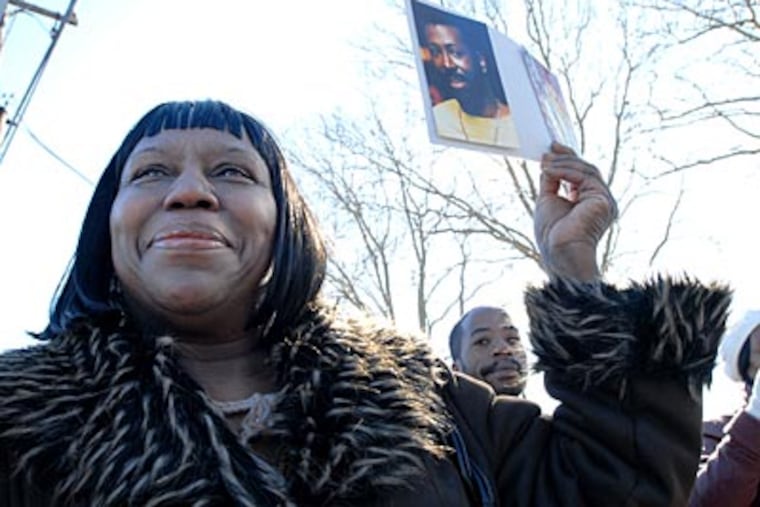Thousands mourn Teddy Pendergrass
Soul singer Teddy Pendergrass' funeral Saturday was the kind of soaring ceremony that punctuates the end of a larger-than-large life.

Soul singer Teddy Pendergrass’ funeral Saturday was the kind of soaring ceremony that punctuates the end of a larger-than-large life.
A 200-member gospel choir jubilated with high-decibel exhultation, while a band and a sternum-vibrating organ roused the estimated 4,000 people who filled mammoth Enon Tabernacle Baptist Church on Cheltenham Avenue, the biggest African American church in Philadelphia.
In turn, singers Melba Moore, Tyrese Gibson, Bunny Sigler, Gerald Austin, Lyfe Jennings, and Musiq performed songs by Pendergrass, a brawny, seductive baritone who leavened an incandescent sexuality with just enough sensitivity to stir arenas full of women and heat any room in which his music played.
“He sounded like hot fudge on cherry vanilla ice cream with all the toppings,” remembered friend and neighbor Dyana Williams, a personality on WRNB-FM (107.9), in an interview last week. “He was delicious, an auditory and visual pleasure - the love man.”
Pendergrass, 59, raised in North Philadelphia and a member of Enon, died Jan. 13 of a protracted illness that followed a diagnosis of colon cancer last year.
Since a 1982 car accident on Lincoln Drive paralyzed him from the neck down, he had to use a wheelchair. But that restraint, preached Enon’s senior pastor, the Rev. Alyn Waller, could not encumber Pendergrass’ spirit and life force.
“He kept on loving and smiling,” Waller enthused during a kinetic eulogy that had him jumping, gesturing, and singing. He added with relish that at one time, Pendergrass himself was a minister.
Pendergrass is known for, among many other songs, “The Love I Lost,” “Bad Luck,” and “If You Don’t Know Me by Now,” all hits performed with Harold Melvin and the Blue Notes.
Pendergrass is renowned for having started as a drummer with that ensemble before discarding his drumsticks and stepping out front with a microphone.
Before today’s ceremony, as his body lay in repose, Pendergrass’ fortified music pulsed through the red-carpeted sanctuary, a familiar voice greeting saddened mourners who dabbed their eyes with clumps of tissues dispensed by white-gloved ushers.
Giant screens flashed photos of the singer, who was a star of Kenny Gamble and Leon Huff’s world-famous Philadelphia International Records.
Gamble and Huff attended today, as did former heavyweight champion Joe Frazier; former Phillies centerfielder Garry Maddox; actor Ben Vereen; and singer Stephanie Mills (who recorded “Feel the Fire” with Pendergrass).
Photo after photo depicted Pendergrass’ carefully crafted macho image - riding a horse, wearing cowboy hats, lying seductively on his side.
“He was the first to show it’s good to be sexy and black,” said McKinley Horton, a piano player with Harold Melvin and the Blue Notes who sat in the audience. “He presented a certain kind of black manhood, with his dark beard and his big smile, that helped send out a strong R&B message.”
Horton said men had envied Pendergrass, whom Melvin called “Rug” because of his thick hair.
During the ceremony, Pendergrass’ manager David Markus said his client “rode Gamble and Huff songs like Ben-Hur at Circus Maximus.” The image of a powerful man in full command of the muscular cadences of the distinctive Philly International sound drew smiles from the audience.
Close Pendergrass friends Williams, of WRNB, and Bill Jolly, Pendergrass’ music director, choked up as they spoke yesterday. Jolly particularly had a hard time introducing a song that he and the band he led were going to do. It was one of the last that Pendergrass himself wrote, “I Am Who I Am.”
“Please pray for us as we attempt to perform this,” he said shakily.
In her talk, Williams said she and Pendergrass had been neighbors. Earlier in the week, she offered an amusingly mundane view of Pendergrass, who lived near her in Penn Valley.
Apparently along with the power to smolder and sell records, Pendergrass also knew a great deal about snow removal.
“He’d give me advice on which company to call to clear snow, and he helped me with ideas for landscaping,” Williams said, laughing.
Yesterday’s ceremony included statements from Pendergrass’ relatives, read by others.
His mother, Ida, who sat in a white dress near the coffin, was quoted as saying Pendergrass was a “miracle” and “the joy of my life,” born to her after six miscarriages.
Seated nearby was Pendergrass’ second wife, Joan, described by Williams as an executive at the New Balance apparel and shoe company in Boston.
In her statement, she exhorted her husband to “sleep tenderly.”
Also on hand was U.S. Rep. Chaka Fattah (D., Pa.), who said he brought condolences from the Obamas.
After the funeral, mourners spoke with admiration of Pendergrass, whom they lauded as a fellow Philadelphian whose music enriched their lives.
Along with the sensual soundtrack Pendergrass’ music provided, his choice to remain here allowed people to connect with him.
“It’s important as a citizen of Philadelphia I come here to support my own,” said Kelly Morris, 47, a SEPTA train operator from West Philadelphia.
“It’s right to be here today. A big part of my appreciation is that Teddy stayed in town, didn’t go out to the west coast.”
“Oh, he didn’t go Hollywood,” agreed Dave Thompson, 64, a Blackwood record producer who worked with Pendergrass. “He loved this town.”
Contact staff writer Alfred Lubrano at 215-854-4969 or alubrano@phillynews.com.